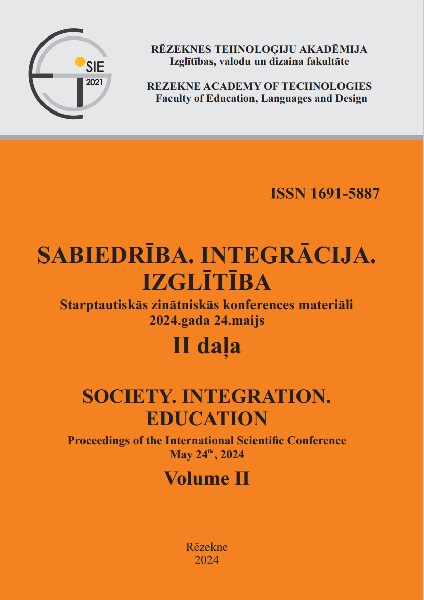METHODS AND ACTIVITIES OF HEALTH COMPETENCE DEVELOPMENT IN NON-FORMAL ENVIRONMENT: EXPERIENCE OF CHILDREN WITH TYPE 1 DIABETES MELLITUS
DOI:
https://doi.org/10.17770/sie2024vol2.7854Keywords:
children, educational activities and methods, health competence, type 1 diabetes mellitusAbstract
Diabetes mellitus is a disease when certain processes in the body, which maintain a normal blood glucose concentration, get imbalanced. Research object is educational methods and activities used for the development and training of health competence. The aim of the research is to reveal educational methods and activities used for the development of health competence in non-formal environment, based on the experience of children with type 1 diabetes mellitus. Research methods: theoretical – analysis, comparison, and generalization of scientific literature; empirical – the use of focus group discussions with children with diabetes mellitus for data collection; Empirical research revealed that various educational methods and activities aimed at developing health competences are carried out for children with type 1 diabetes mellitus in non-formal educational environments (medical facilities, summer camps and health camps). The following activities and classes are used in medical facilities: lessons, conversations, questionnaires, and games. Activities used in summer camps are as follows: walks, cycling, games designed to develop physical activity skills. In the educational environment of health cams, the following educational methods and activities are used for the development of health competence for children with type 1 diabetes mellitus: lessons, games, educational activities, trips, and creative activities.References
Bozkurt, E., Atay, E., Bilir, A., Ertekin, A., Bugra-Koca, H. B. &Sabaner, M. C. (2021). A novel model of early type 1 diabetes mellitus: The chick embryo air sack model. Saudi Journal of Biological Sciences, 28(10), 5538–5546.
Bulikaitė, V. (2022). Cukriniu diabetu sergančiųjų pacientų mokymo ir konsultavimo ypatumai. Slauga. Mokslas ir praktika,1, (301).
Gudžinskienė, V. (2000). Kritinio mąstymo svarba ugdant sveiką gyvenseną. Vilnius: metodinė priemonė.
Gudžinskienė, V. (2013). Jaunimo socialinės sveikatos ugdymas: monografija. Vilnius: Mykolo Romerio universitetas.
Gurkan, K. P.& Bahar, Z. (2020). Living with diabetes: perceived barriers of adolescents. Nursing research, 28(2), 73–80.
Yin, R. K. (2009). Case study research: Design and methods (4-as leidimas). Los Angeles: Sage. Retrieved from: https://books.google.lt/books?id=BWea_9ZGQMwC&printsec=frontcover&hl=lt&source=gbs_ge_summary_r&cad=0#v=onepage&q&f=false
Ivaškienė, J. & Malinauskienė, D. (2021). Pradinių klasių mokinių ugdymas: kokybės aspektas. Švietimas: politika, vadyba, kokybė, 13(1), 10–21. Retrieved from: https://doi.org/10.48127/spvk-epmq/21.13.10
Mayring, P. Qualitative content analysis, (2014), Retrieved from https://www.ssoar.info/ssoar/bitstream/handle/document/39517/ssoar-2014-mayring-Qualitative_content_analysis_theoretical_foundation.pdf
McKendree, T. & Piscatelle, G. (2021). Improving the care of children with diabetes in school through staff education. Retrieved from:Murray State's Digital Commons - Scholars Week: Improving the Care of Children with Diabetes in School Through Staff Education
Sherif, S., Kralev, J. Slavov, T. & Kunchev, V. (2020). Design of the H∞ regulator for the control of glucose concentration in patients with first type diabetes. IOP Conference Series: Materials Science and Engineering, 878.






